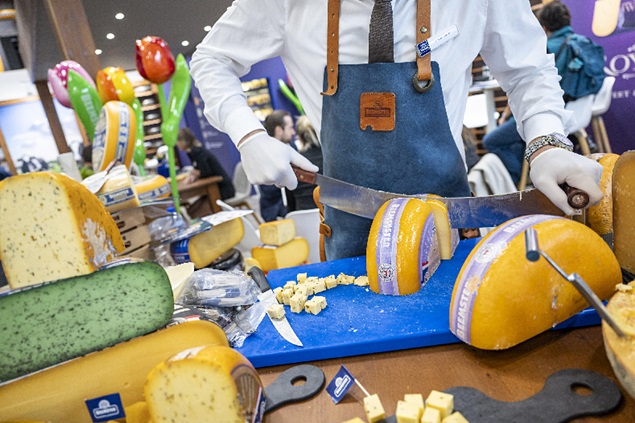1798

Dairy products were perhaps the most prominent product trend in Hall 10.1, where most dairy product companies exhibited. In addition to yogurt and high-protein milk, cheese formulated to attract health-conscious, active consumers was promoted as a low-fat and protein-rich alternative to traditional yellow cheeses, as reported by DairyReporter.
Fortified Dairy
The Dutch dairy company Daily Dairy presented its "Strong People!" range of dairy products and high-protein ingredients for the first time, including whey and BCAA powder and a 40g cheese snack with less than 3g of fat (10.4g per 100g) and 12g of protein per snack (30g per 100g).
Johan van Diermen told us, "We are ready to enter the retail market first in the Netherlands and Germany, and then internationally. We are always looking for product niches, traditionally for our flavored Gouda products, but we are also aware of any other product trends that might be an opportunity for us.
Active nutrition is very popular right now, and these products are designed to attract fitness enthusiasts who are very conscious of their dietary intake. We tried to produce a low-fat cheese that also tastes good without adding anything that doesn't naturally belong to cheese. Therefore, our product contains cow's milk, salt, and cultures and is naturally rich in protein."
He added that the range will be available in supermarkets in both countries and will be sold at lower prices than direct-to-consumer solutions.
3% Fat Cheese
Elsewhere, the British brand Good Cheese showcased its range of high-protein, low-fat cheese blocks, including 3% fat Original and a "family" pack with 10% fat. For reference, a typical block of British cheddar contains at least 30g of fat. "We remove the fat, and the protein naturally increases," said Dean Towey of the company.
"We don't add any extra protein; it all comes from the milk itself. The 10% fat version, the mature cheese product, was launched to a broader audience, including families. We know that in 30% of households in the UK, someone is on a diet, so this is the type of consumer we are trying to target."
The cheeses are also lactose-free, making them an option for consumers with lactose intolerance. eatlean also introduced a 2g fat cheese stick, designed to attract on-the-go shoppers who prefer savory snacks, and the new protein cheese stick.
Functional Dairy Spreads
Italy's Inalpi also introduced its Protein+ range for the first time at the show. From spreads to slices, the company is betting on the growing appetite of consumers for functional dairy products.
"In Italy, such products sell very well," said Lorenzo Invernizzi of the company. "We are also developing a shake and a protein powder in the same range. Our spreadable cheese will be launched in January." Both the spreadable cheese and slices contain 25g of protein per 100g of product.
Enriched Yogurt
Several Greek dairy companies highlighted functional dairy product offerings this year. Among them was Kri Kri, which promoted its high-protein yogurt packs. A company representative said they believe the demand for this type of product will continue in the coming years.
"We sell these yogurts in Greece, North Macedonia, and Belgium. We've had this range since 2016, but it has become even more popular in the last few years. We believe this trend of functional yogurt for active consumers is here to stay."
Similarly, the Greek organic dairy brand Kourellas, specializing in organic dairy products, including cow, goat, and sheep products, presented its new range of Elixir Probiotic drinking yogurt and kefir. The products are available in 250ml/8oz bottles, containing active probiotic cultures and come in three natural flavors – carrot, strawberry, and vanilla.
The company also offers flavored goat milk kefir in 32 oz (1L) packages for the US market, and the new range of probiotic-enriched drinking yogurts from Rellas.
Spreadable Cheese
While functional beverages, yogurt, and cheese were easily noticed on the show floor, spreadable products were more of a niche when it came to offerings with additional health benefits.
Spain's Quescrem was among the few manufacturers to choose spreadable cheese as the format to incorporate functional ingredients. They claimed to be the "first" to use kefir cultures in place of cheese cultures in their kefir cream cheese, without added preservatives or stabilizers.
"It was challenging to make a stable product due to acidity and also because it is lower in fat, which can make the texture granular, something we wanted to avoid," said Brendán Gómez Hombre of the company. "We use curd, cream, and cow's milk in our formula to naturally improve the texture and maintain a clean label. In this special product, we increased the amount of curd to raise the protein level." The spread contains 9g of protein per 100g of the product.
Enriched Ricotta
Similarly, the Italian dairy group Granarolo highlighted a range of protein-enriched cheeses, beverages, and snacks, including protein-rich ricotta, fresh mozzarella, and flavored shakes. Martina Tonelli of the company said that protein-rich dairy products are "very popular in Italy," and the company is working to rapidly expand its better-for-you product range.
"We already have milkshakes, mozzarella, ricotta, and cheese bites available, but in October, we're also launching BCAA-fortified desserts in three flavors - dark chocolate, vanilla, and panna cotta, all made from Italian milk," Tonelli said.
"In 2024, we're launching three types of protein bars with 13 grams of protein per bar and spreadable products without palm oil and gluten in cocoa and hazelnut, respectively, pistachio." (Photo: Anuga-Press official website)





